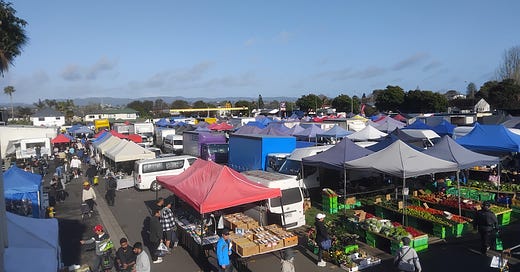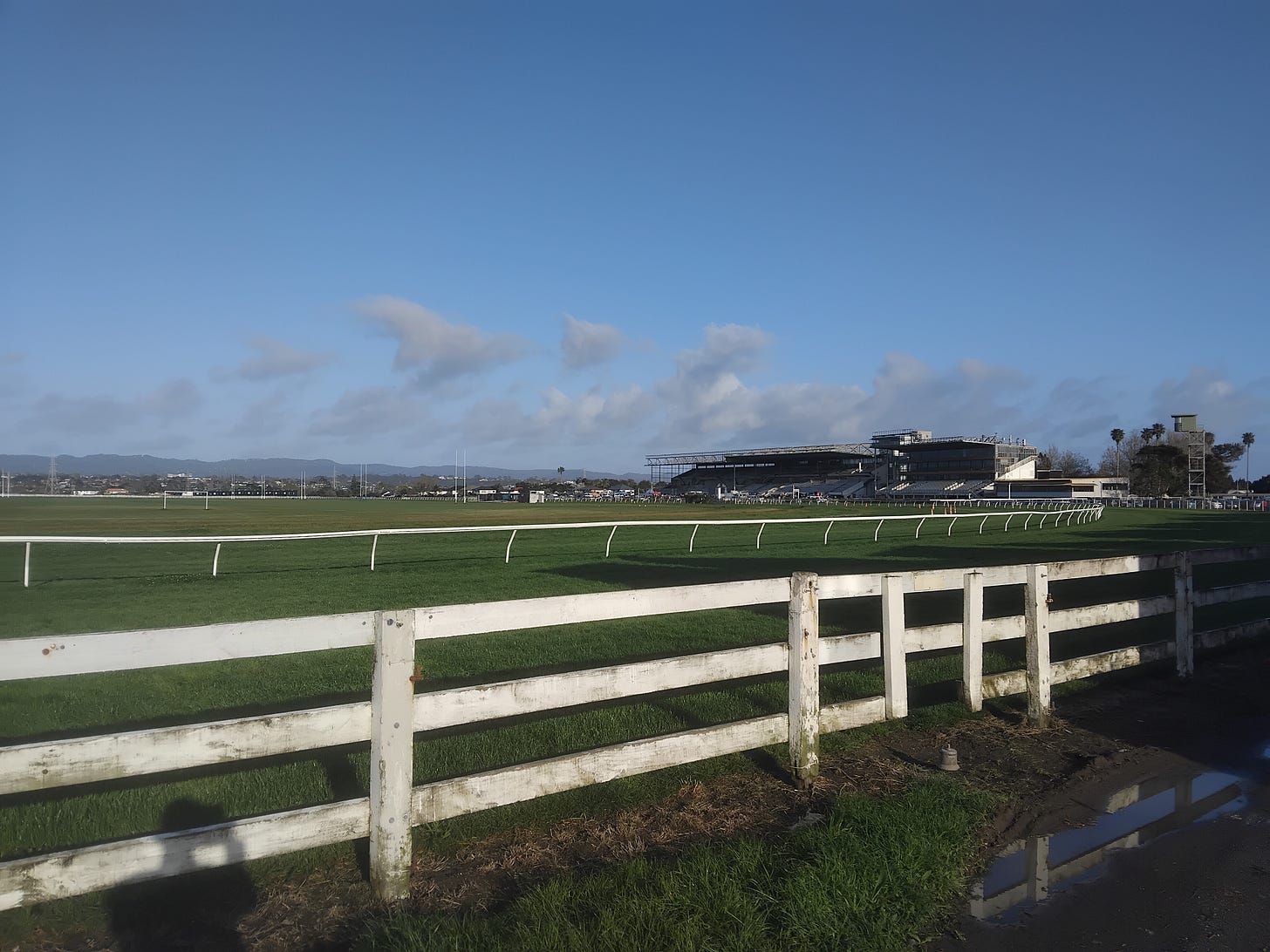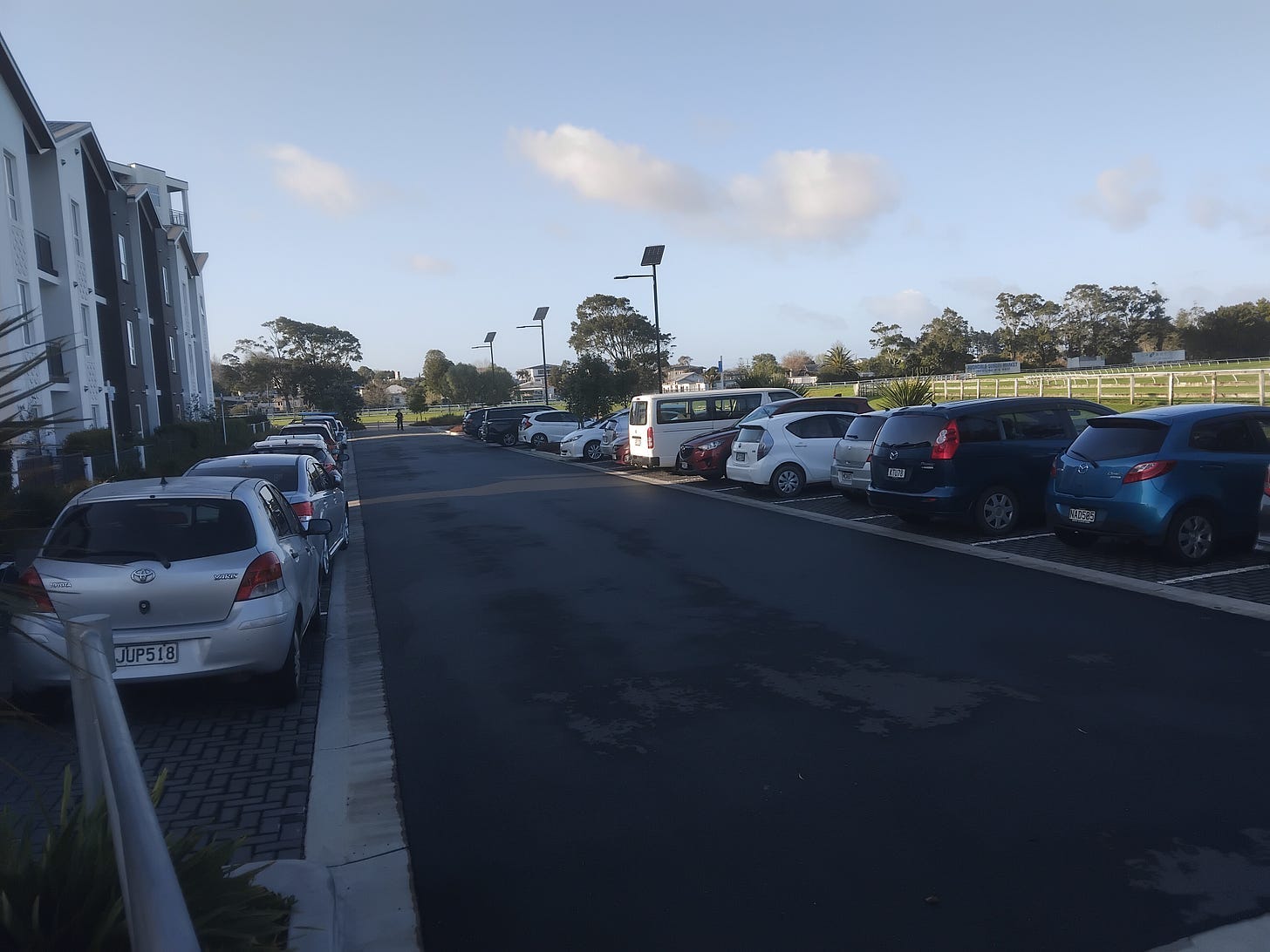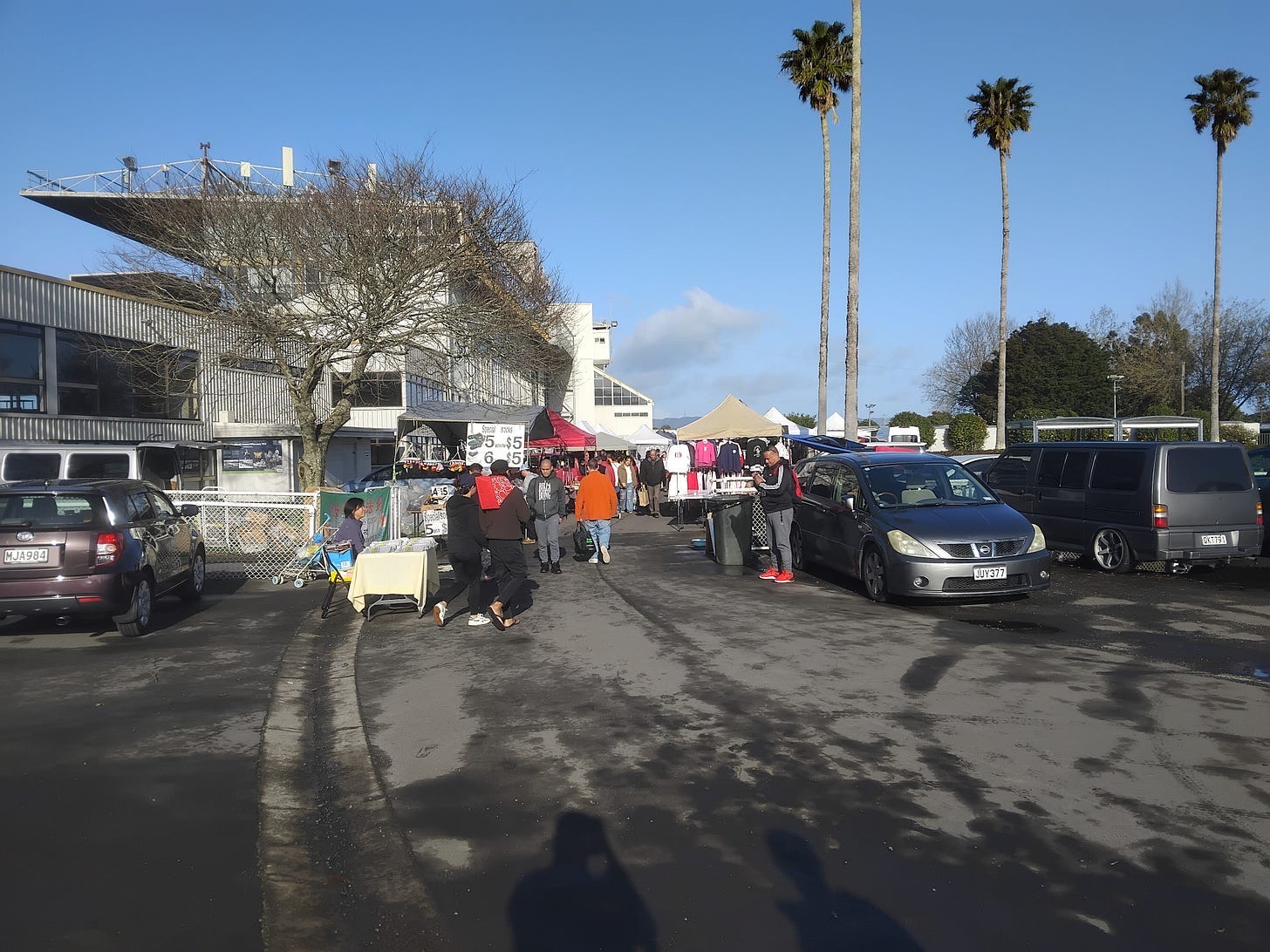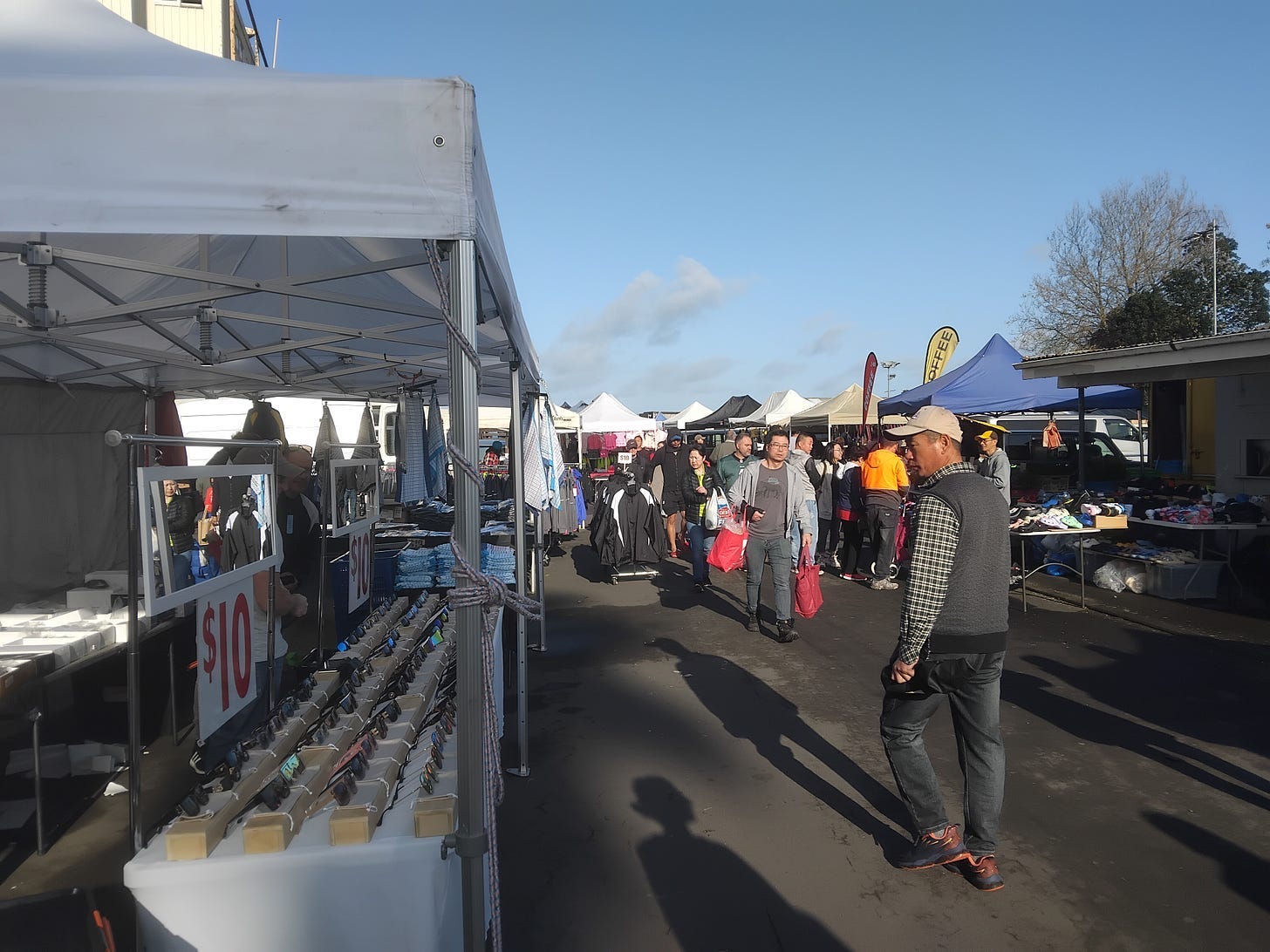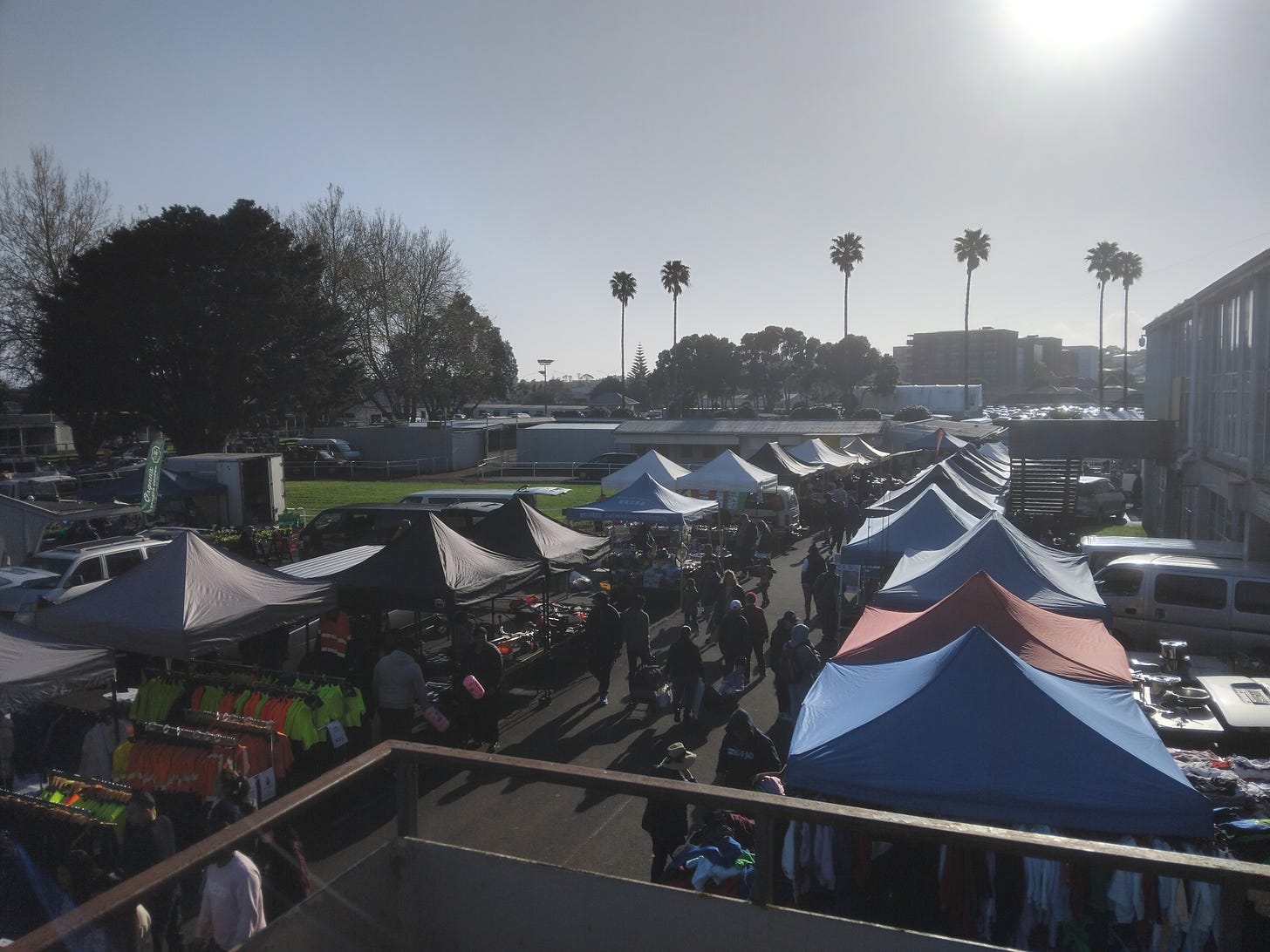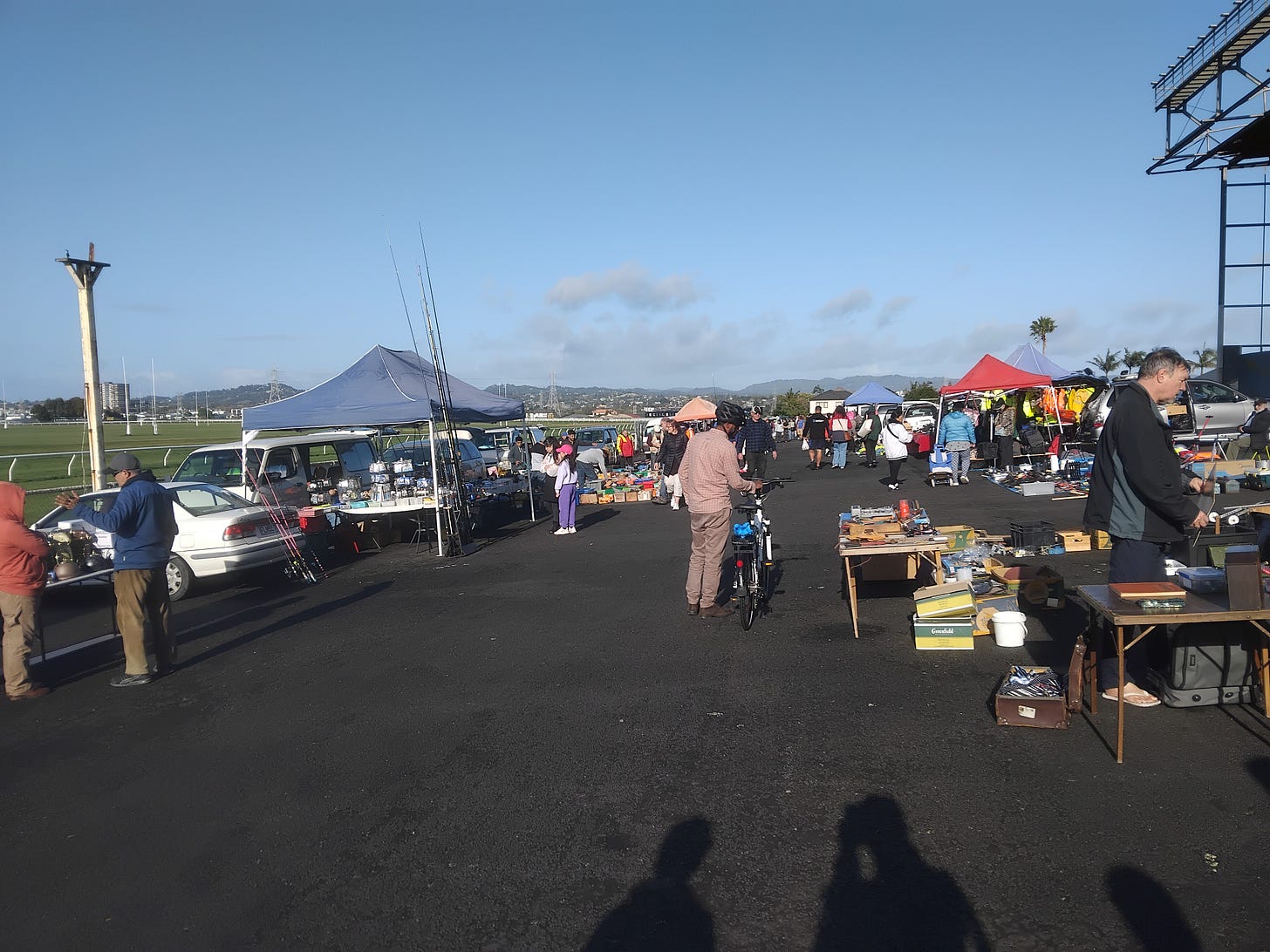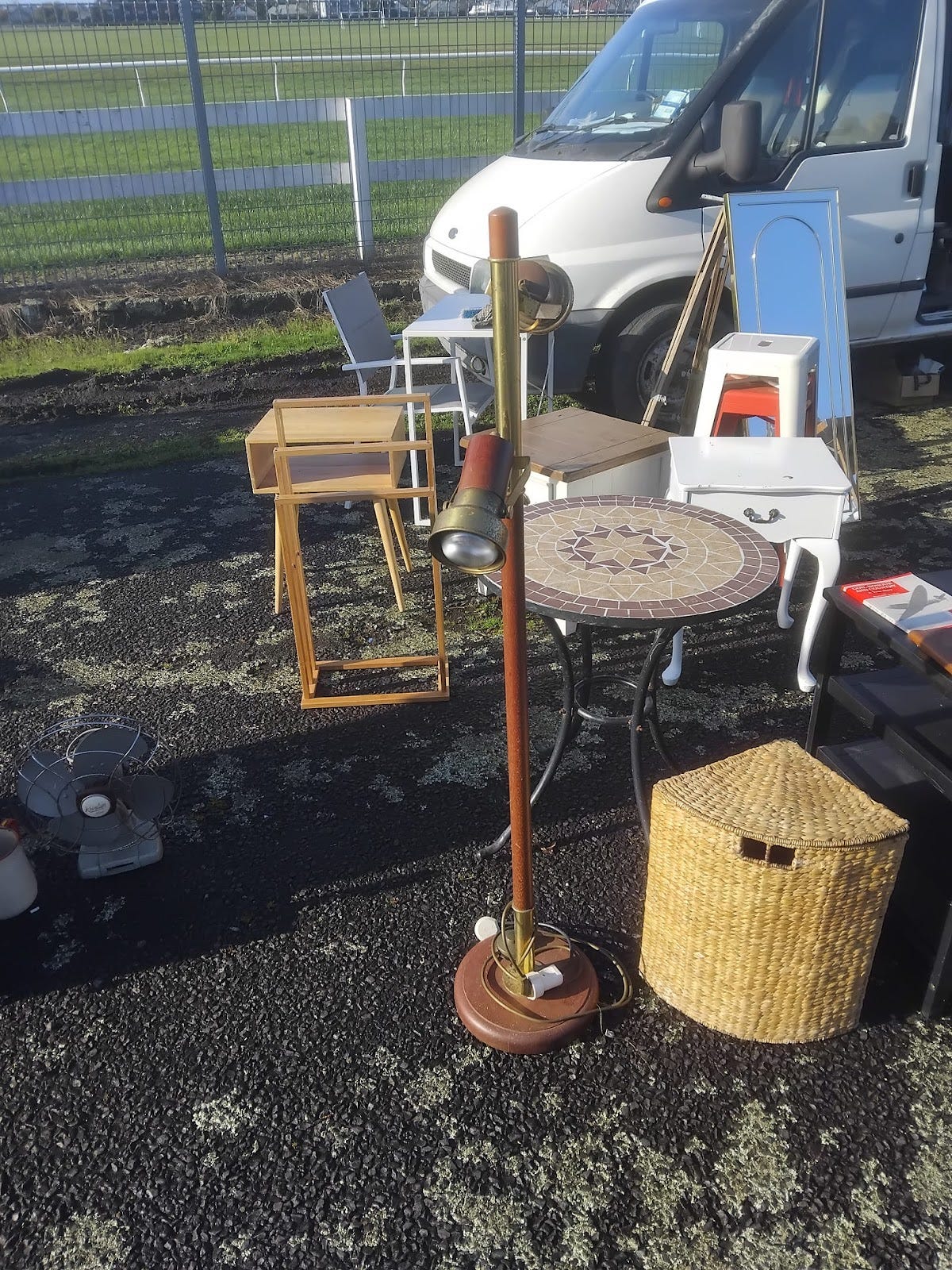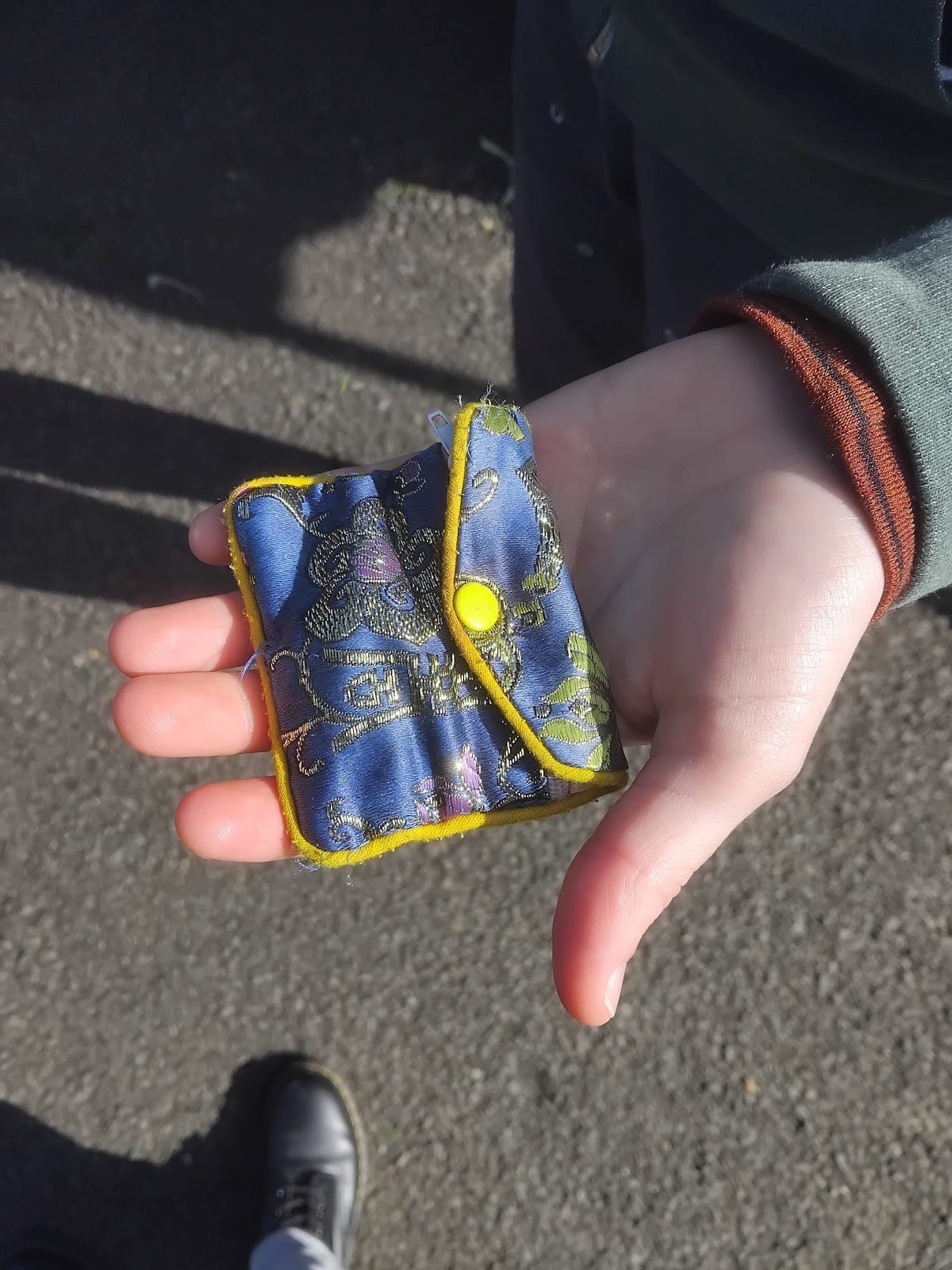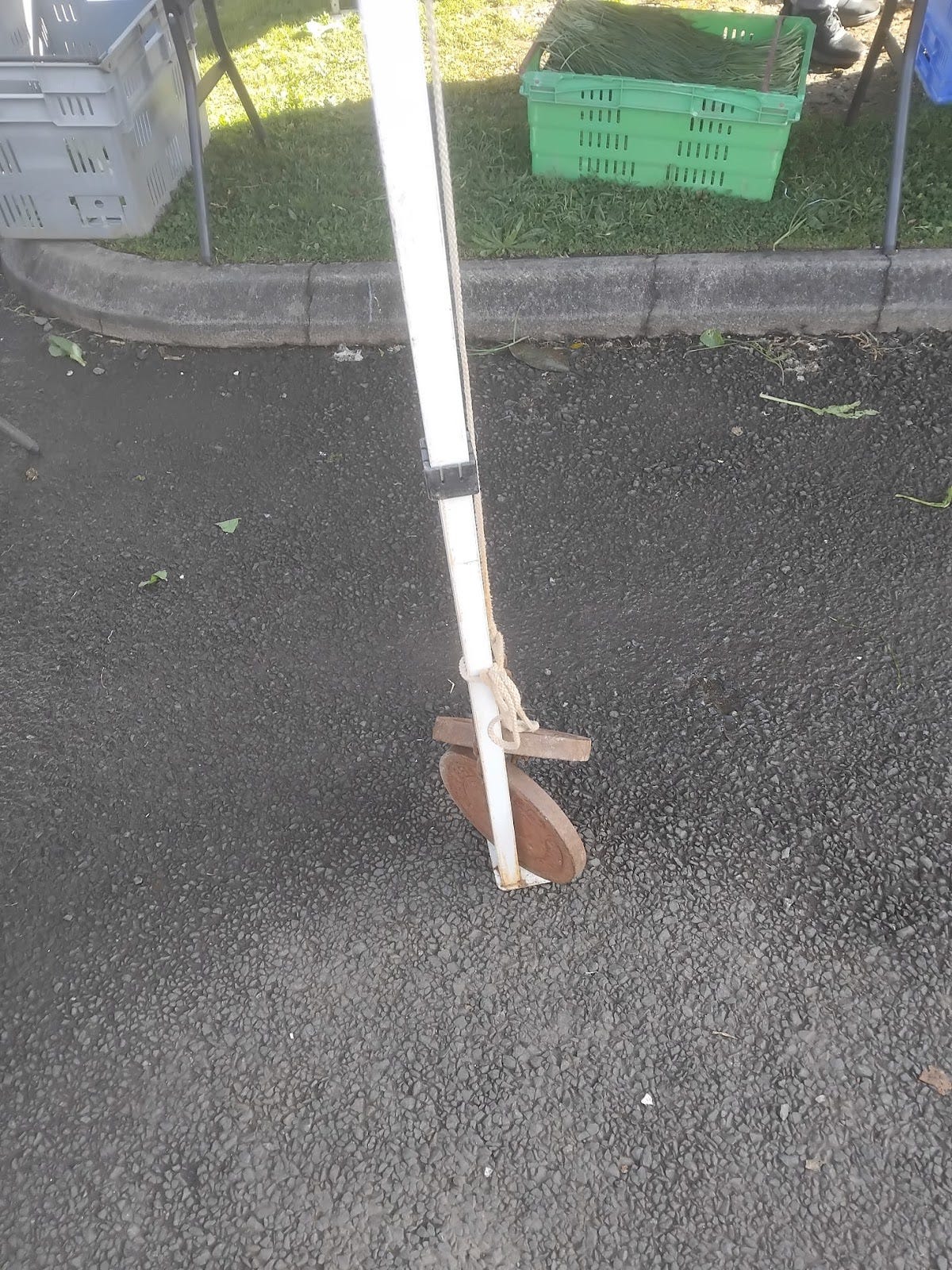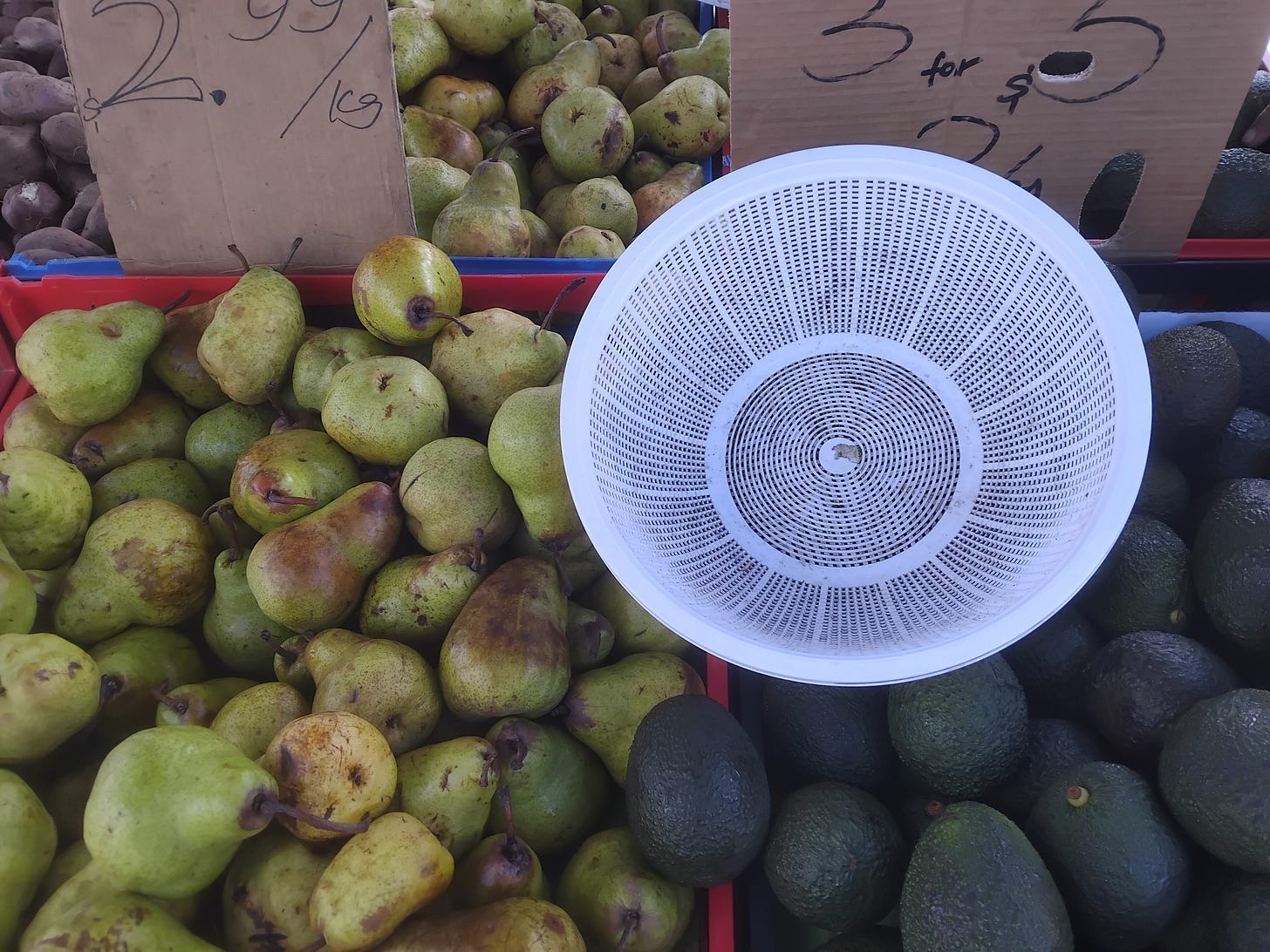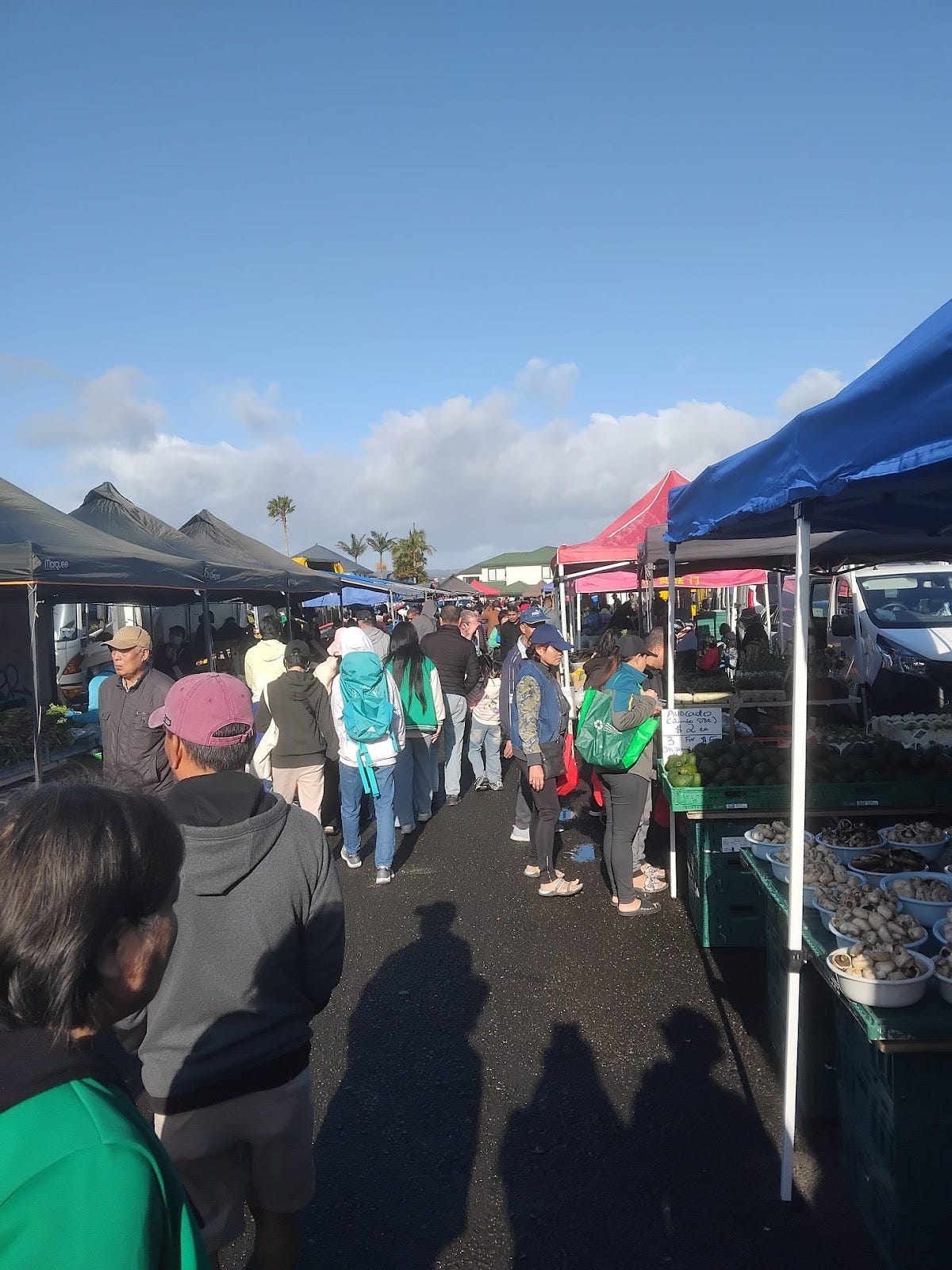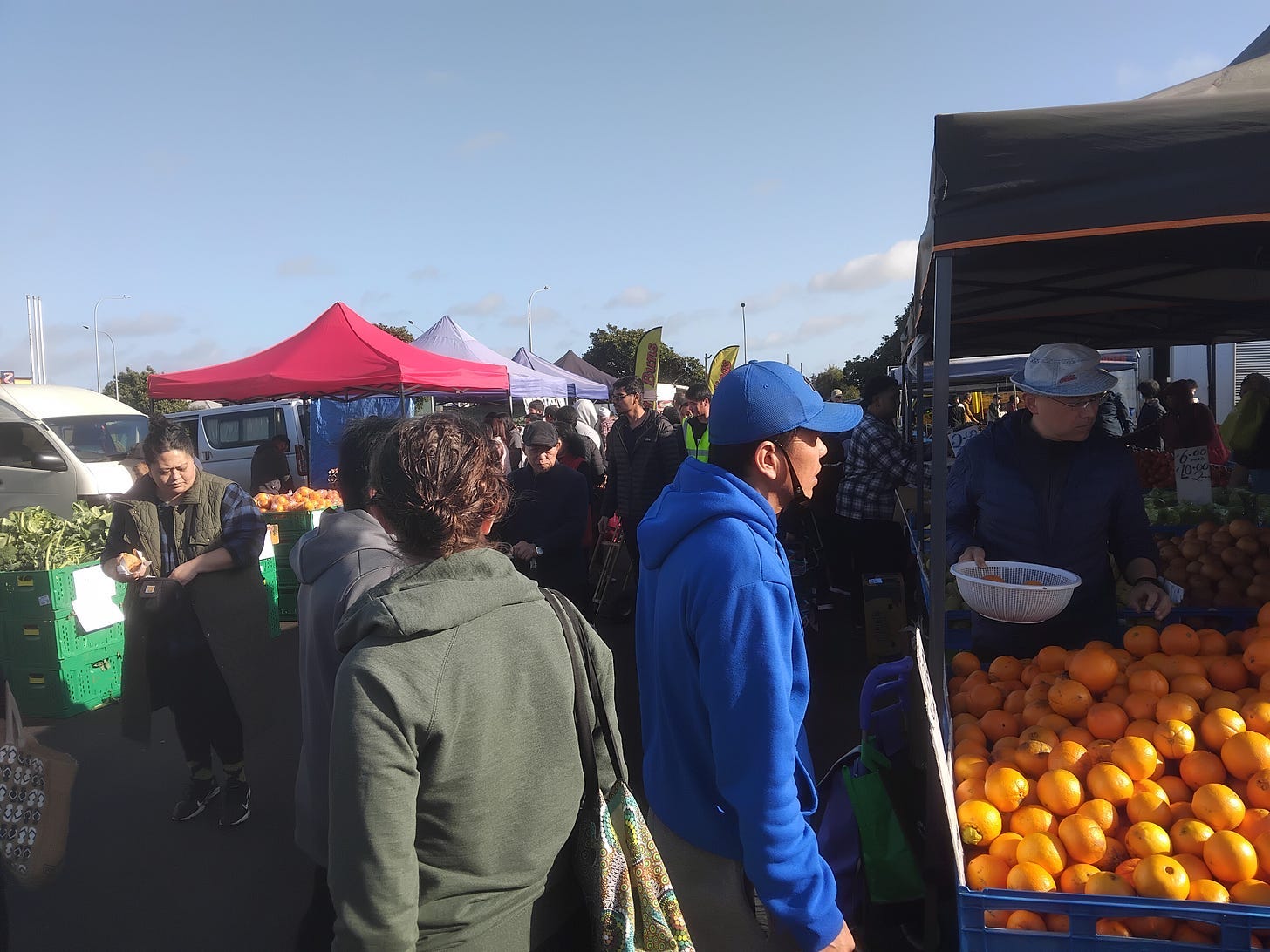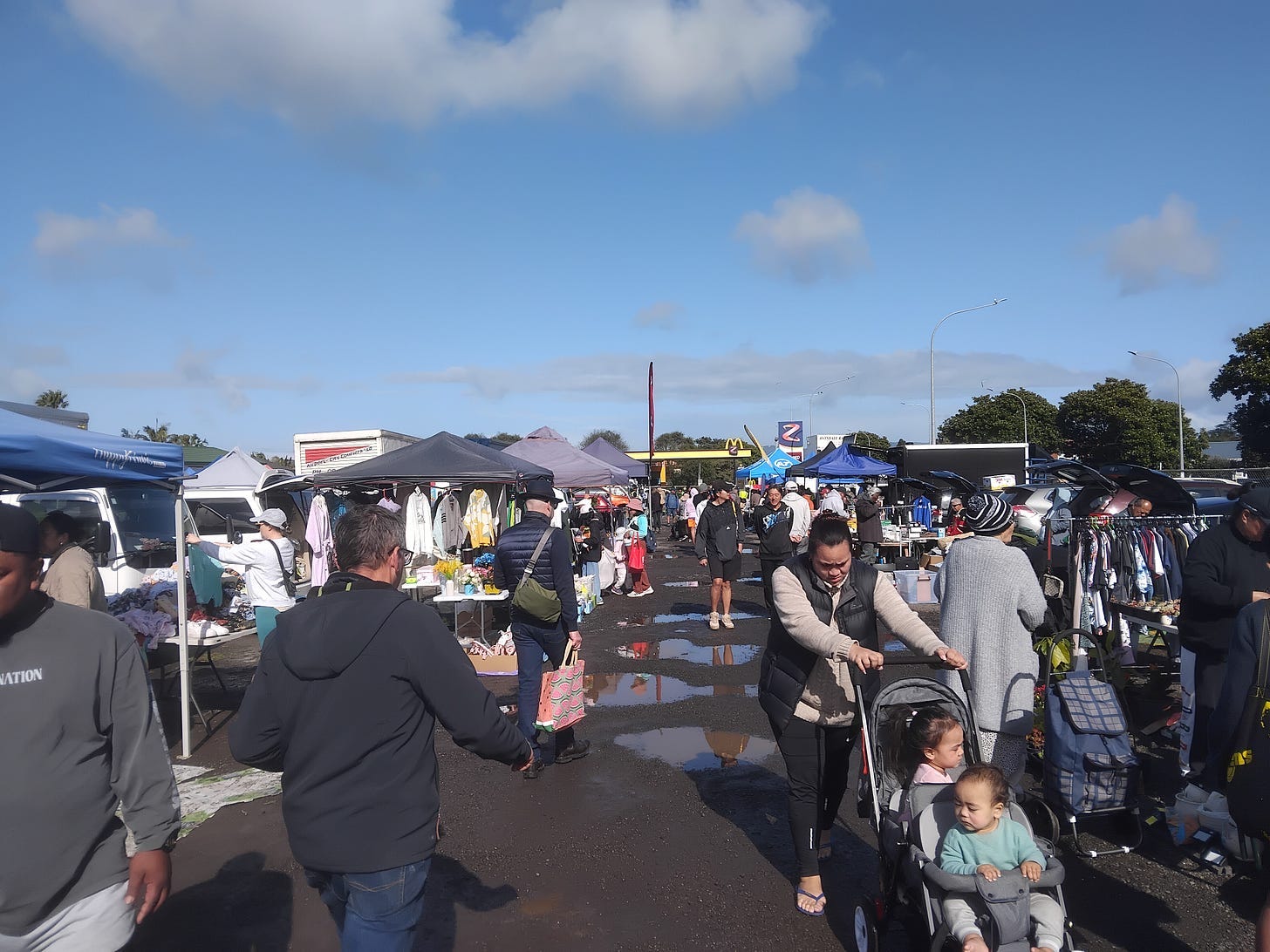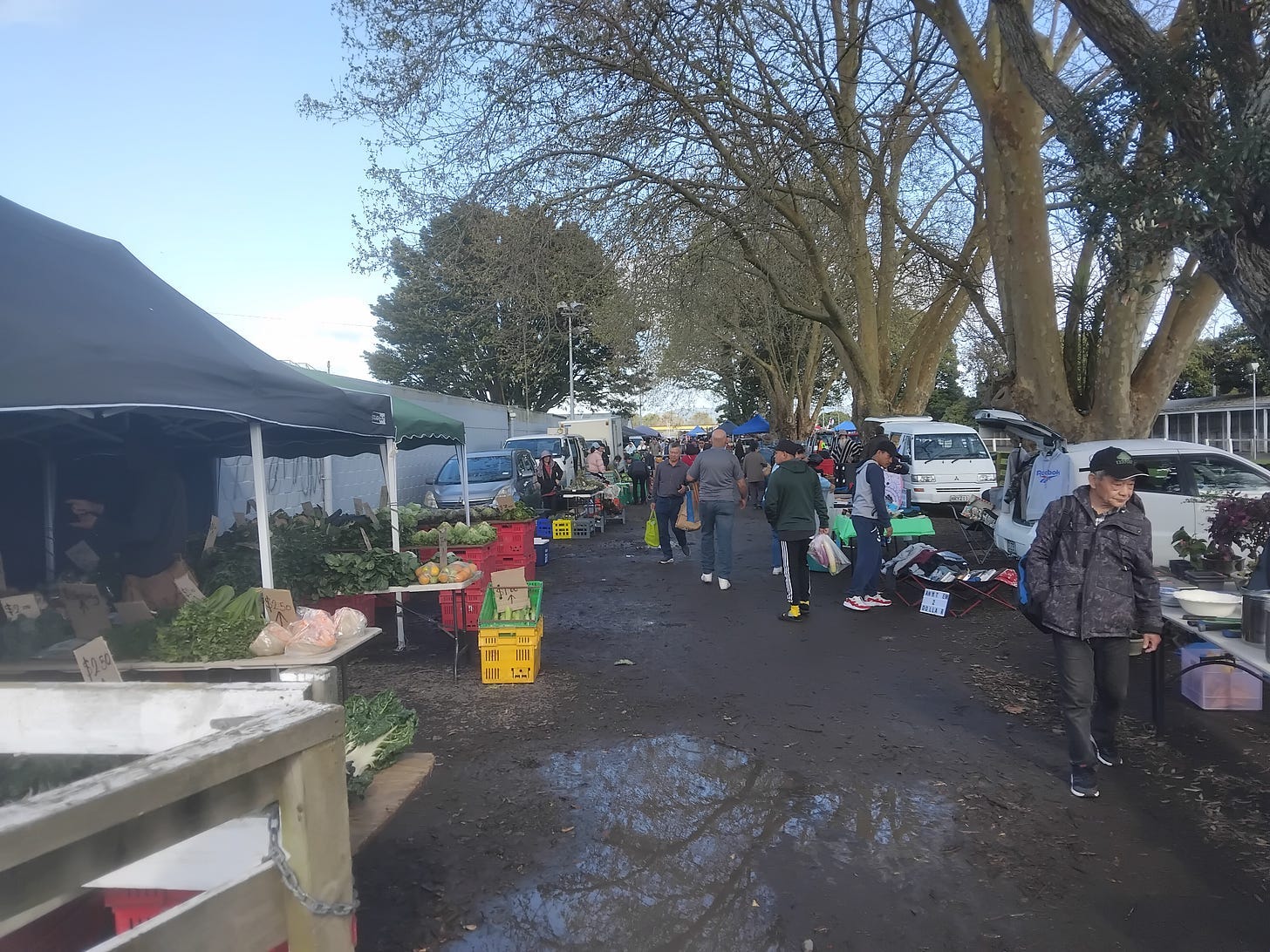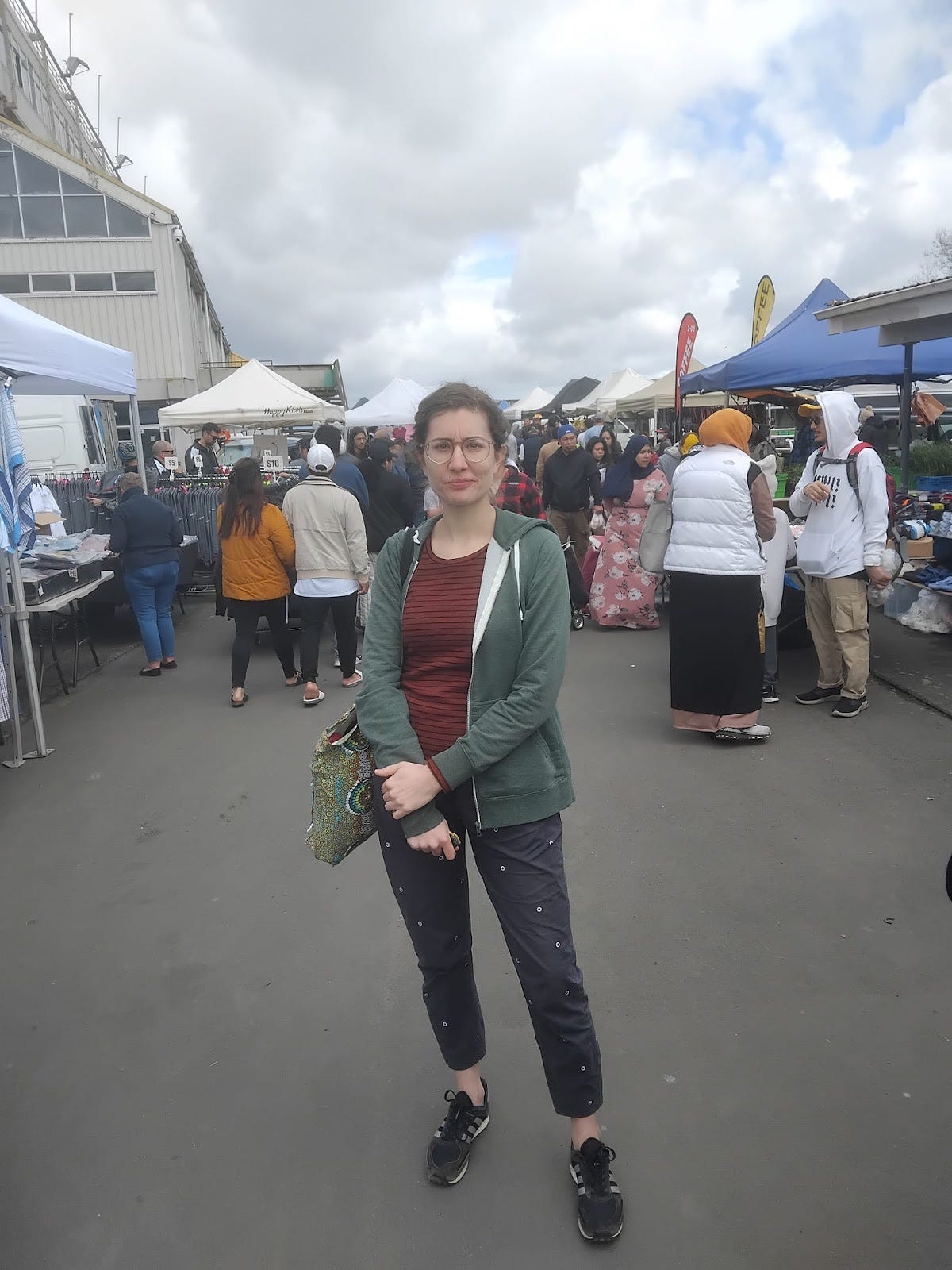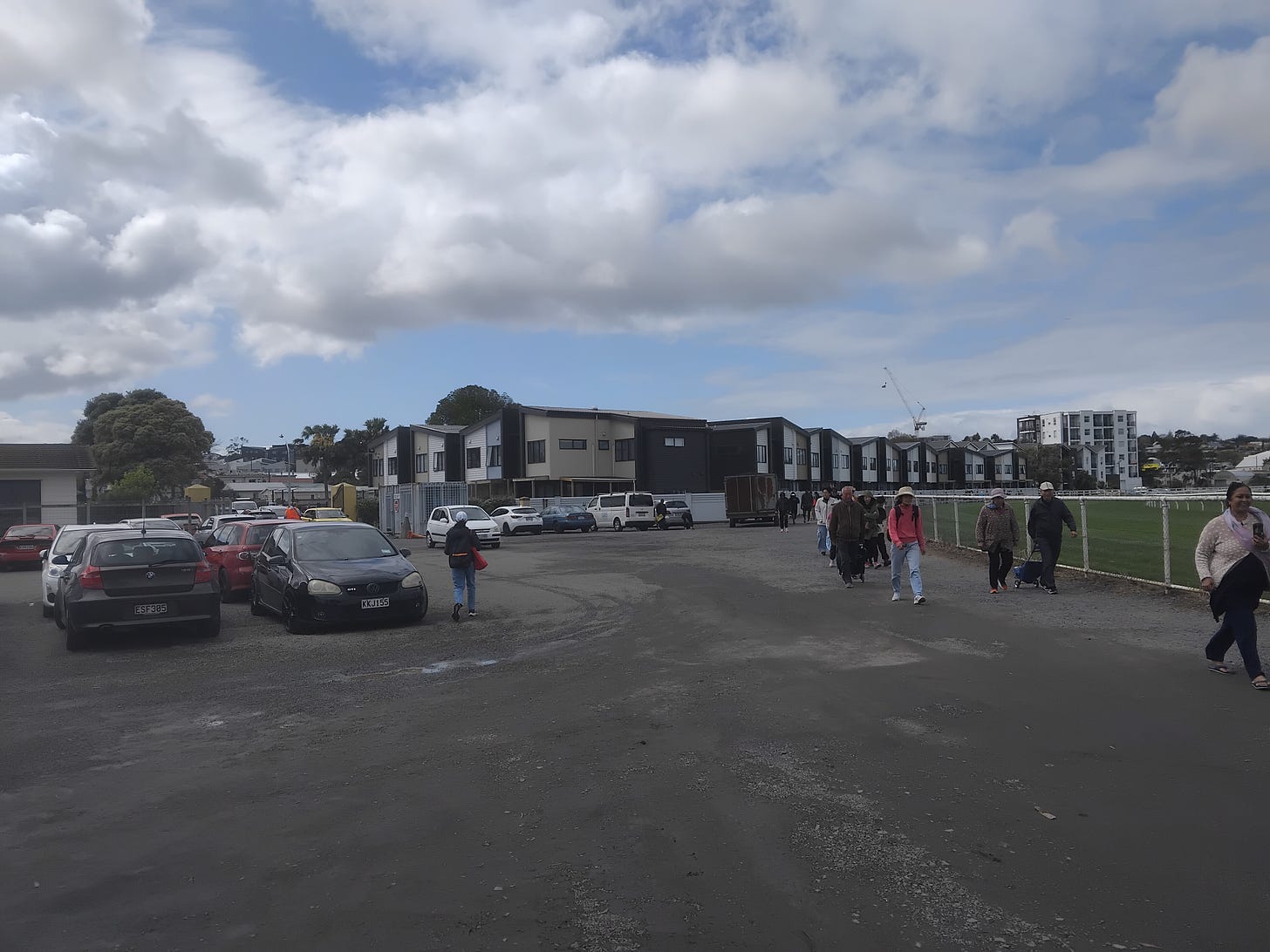On a bright and early morning I hopped on a bus to head over to the Avondale Racecourse.
I was here to meet a friend of mine, Meredith, a 32 year old urban designer who’d lived in the Avondale area for the last 5 years. While Meredith had recently moved away, and was soon to leave the country for a while, the weekly rhythm of a Sunday market still shaped her life in Auckland and how she lived and felt. For me, a novice market goer, Meredith was to be my guide for this whole other world, which ebbs and flows every weekend, rain or shine, storm or heat, as people come and go to spend, trade, and connect with each other.
We met down a street nearby, Racecourse Parade, a quick walk from a city centre bus and ample bike parking for a cyclist like Meredith. From there it’s a few minutes walk to the market itself.
Her discovery of the Avondale Market began with veggies. Living in an apartment, you don’t always have a garden to grow fresh fruit and vegetables. But weekly markets provide an opportunity to get fresh produce every week.
And for Meredith, once it became a habit, a weekly rhythm, it also started to become something more. A ritual to go and experience another gritty world of human connection. To escape from the wider world for a bit. But why? What is the Avondale Market to Meredith? And what is it to everyone else?
We walked over to stand in front of the entrance, and Meredith talked of this.
Each Sunday, she could come here and ground herself in the bustle of people. The familiar faces and regular market goers and stalls, and the crowds of everyone from all over Auckland. This place was a way for her to escape, to immerse herself in the crowds and feel like she's just another tiny little person in the grand scheme of things, interspersed with the different cultures and stories that everyone here has behind them.
It means when things feel grim, uncertain or change, she can come here and not have to dwell on the wider world for a little while. Meredith recalls visiting the market the day after the 2023 election, and feeling a sense of hope to be with everyone still living life as usual, despite all their differences in not just politics, but culture, language, age etc. The Market was a place to be human, enjoy the vibes and feel the familiarity.
Ironically, it’s why you would also see those who want to be seen and heard. Meredith mentioned many come to the Market to speak of religion, politics, even the occasional blogger, and more - coming to connect with the throngs of market goers. But when you walk around, they are not what dominates. Because the reason the crowds show is the market itself, its goods and all its intricacies.
And so many people come each week, regardless of weather. They come every Sunday to Avondale for these markets. Some to sell goods, some sing: one lady at the entrance that we passed comes every week to recite Shakespeare, Poets and more, Meredith said.
Why? Who knows, but that’s her thing.
Then there’s the people she sees every week. Meredith gets the freshest tofu she’s ever had here, from ‘the Tofu Guy’. Who is Tofu Guy? Do we need to know? Does it really need more of a reason in that he sells great tofu and Meredith loves to support him!? And there’s the numerous familiar faces at fruit and veggie stalls. Or the friends and neighbours she runs into.
But what makes those connections develop? Why come here and not say, a supermarket?
Meredith finds that buying things from here is different than it is from a shop. It “feels very human”, to meander through the market, buying fresh produce (that lasts ages!), see all those who are selling and connect with them through each small purchase.
That fluidity creates connection between people, a tension - but not one with malice. If we think of how supermarkets or online shopping work, in many ways that human connection is gone. Yet here at the market, this ephemeral place that at its core concept goes back to ancient times, it’s right back to a person and another person connecting.
And this doesn’t just stop at produce. Bartering for the knick-knacks and antiques at the Avondale Markets is also another way to connect. Cups and lamps, old magazines, clothes, tools and more. Some come to the markets for a weekly shop, others to find hidden treasures. Whatever the reason, odds are there will be something here.
So much diversity in second hand goods, odds are, as Meredith muses, there’s “anything you could ever dream of”.
And a diversity of goods brings a diversity of people. But markets, particularly the Avondale Markets, also has it’s own unique culture. The world of market-goers is different to shopping in malls, stores, or streets. In many ways it’s not super common in New Zealand.
Some of that is in the practical. Regulars have all sorts of ways to carry their purchased goods, or hold their money. Tote bags and coin pouches, produce bags, trolleys and more. Meredith mused to me if she should now buy one of the trolleys that so many regular goers use. For now, a large tote bag works. The ubiquitous market trolleys also differ; some bought as a whole, others ramshackle, trolleys tied to boxes to carry goods, others have prams - yet only fruit and veggies sit within (although the place is friendly for toddlers!).
This practicality also extends to stallholders. Meredith points out to me the eclectic mix of stalls. No specific care for appearance, but all cobbled together with what works. Weights and water bottles to hold stalls down, tarps of all colours, car boots, sheets on the ground, and tables and trays of all sorts.
Things change with the times here, too. After plastic bags were banned, produce stalls now had plastic bowls to collect goods to take to inside a stall to be weighed and sold. Innovations to make things work, yet who first brought such a bowl? Markets have a sense of organic communal change and adaption, yet always hold function over aesthetic. This is true for prices as well, organised chaos, changing signs as prices change over the day, fluidity over time.
Changes are naturally forced over time as the world changes. To Meredith, markets can serve as a microcosm to cities - in that as we change, as the world changes, so do our spaces and places.
The other side of market culture, is in the etiquette and actions of those in the crowds. Assertiveness is a given, divorced from any sense of rudeness it might have in a brick and mortar store, the nature of markets means you often need to jostle to the front to pay for goods.
The bustling crowds also require market goers to keep their feet steady, flows of people require everyone to be alert and respect how others move. It’s not hard to disrupt the mass movement of folks if you join at the wrong time, or stop, or try to head in the wrong direction.
And this all can “take some time to get used to”, as new visitors it’s quite different to other forms of shopping. Meredith often brings friends and family around the markets, and those coming for their first time often express surprise. A “woah what are you doing?” to behaviour that in the market world is normal, but in the wider world of New Zealand, may be very different.
The language of markets is also unique and diverse. Scrawled names and prices in vivid on scraps of cardboard, propped up by produce. What is ‘bitterroot’? Beetroot! A typo, but re-used and repeated each week.. Meredith reflects that the market could have twenty different languages, yet everyone can all find similar communication. Many languages intermix at the Avondale Markets, but despite these barriers exchange persists through hand gestures, eye contact, and the odd stranger helping out as interpreter. It seems that anyone can attain this market-fluency by immersing yourself in this world.
Because once someone is familiar, it can become almost instinctive, knowing when and how to move, but also knowing when and what to buy. In Meredith’s first time coming to the Avondale Markets she recalls how she impulsively bought something she wanted at the first stall, only to later find the same thing at a cheaper price. This exact thing happened to me on our visit. Over time, you develop that instinctive feeling, knowing roughly how much something costs and knowing how to shop around a bit for the best price.
To enter this world of markets, people have to come from somewhere. Stallholder, first time or regular, that differs. Early in the morning is set up, where the foundation of this temporal community is assembled. And then the people come. Some by public transport, some by car and some by bike or walking from nearby.
This way of travelling also affects what you can buy. Coming with a trolley on public transport, your goods and produce will be limited by what trolley you have. For those with cars, maybe you can buy some of the bigger things - tools, mowers, and more. Meredith? She’s limited by her bike and pannier bag - what can’t fit can’t be bought.
Internally, the market requires it’s own navigation. No cars, only people, and the perennial layout and pathways that reform each week direct crowds and people around. Chaotic, yet shaped by the environment.
Depending on how a visitor travels, Meredith will meet them at different entrances. The way which people travel means their introduction will differ, what they see and experience first. It’s also easy to get lost or disoriented, if you are unfamiliar, so a friendly guide or buddy helps. And some find this market is not for them - but all will experience this world differently.
Speaking of others. Another aspect of market connections is seeing people you know - friends, family or more. This is a space to see people in a “non-pretentious setting”, as Meredith remarked. On our visit we ran into two friends.
First we saw Imran an old colleague of Meredith’s who was buying produce for his family’s shop. For Imran, he ordered goods in advance to collect, instead of needing to head to Pukekohe. Coming to Avondale Markets was easier, as growers come here so you can make connections, get a bargain, find goods cheaper than supermarkets and have access to different goods of all sorts. These ties, these connections between businesses and the market, often extend far longer, more than decades.
And this chat, this shows how people experience and connect with the Avondale Markets differently. Meredith said that she thought the shop owners had informal ties with buyers, but Imran shows us there are far more formal processes in place too. And you see that with others, chefs in branded uniforms getting fresh produce for restaurants, juxtaposed with crowds - individuals all being their individual selves.. Each and every person comes for a different reason and experiences it in a different way. What shapes this? Our own stories and lives.
The other we ran into was Steve, someone we both mutually know. How conversation broadened, how did the Avondale Market fit in with the wider world? The market here is a fantastic urban spot. Different from other markets, say Britomart, Ponsonby or elsewhere, and very fruit and veggie focused. The grittiness creates a down to earth space, and intermixes cultures of Asia, the Pacific, Te ao Māori, and more. It in many ways is a genuine growers market, with a temporal setting, whereas overseas - Steve used Melbourne as an example - you might see a more food court style, more European focused with specific styles, covered structures like halls, and permanent vendors
We talked of how the experience of many markets in Auckland feels curated to the ‘best’ ‘feeling’ or ‘experience’ of an idealised market, whereas in Avondale, it is simply about the market activity - to sell things and buy. It was open, anyone can walk in, whereas formal styled markets give a feeling of needing to enter a court, or structured place. Avondale in that sense felt like a genuine market, and also provided a space for any culture, or any person, whether a migrant recently arrived or someone born here to connect, peruse and buy what they need or want. This openness, also provided opportunities for migrants to also grow, sell and find goods and produce that is not commonplace in New Zealand supermarkets.
And that’s the thing, all the people who intermixed in the crowds, they come from all over Auckland and all over the world. While Avondale Markets are just one temporary place, its roots stretch all across to connect with so many from so far. South and north, west and east, and centre. Or from established to informal, stall and store to car boot or spread.
This world also loops through the seasons. The place takes a different tone yet still remains the Avondale Markets. For Meredith it might be gumboots and raincoats in winter, to sandals and hats in summer. Seasonality of produce, different fruit and vege that changes. And your actions also change, summer is a spontaneous buying season for Meredith, making the most of summer bounty and cooking up preserves - taking what is seasonal and cheap and extending into the future.
What is available and what you buy is all about who someone is, and what they need or want. The good feeling of a bag full of fresh food for the week and the enormous variety (and value) to cater for a wide range of dietary needs, preferences, or food types, draws Meredith, and so many others, to the market.
Meredith has childhood family friends, who are from Cambodia, that used to travel once a month to Avondale from Hamilton (where Meredith is from) for specific Cambodian produce that is rare to find anywhere else. Meredith herself was born and lived in Thailand for awhile, and enjoys finding specific Thai ingredients, like mini eggplants, to get for her mum to cook. One of the best places to recreate their memories of what food is like in Thailand, is with things only really found here in Avondale each Sunday.
The market also gives people a chance to broaden horizons, trying new things. Meredith told a story of how she saw a herb she didn’t know (methi) and after asking, the vender talked of it’s use in India, broke some off for free for her cook with it and said to come back to buy more if she liked it. This open, informal relationship between vendors and market goers allows things like that to happen, this human connection that is missing when buying things from a store or online. Even newcomers like me can experience that - I scored a free chilli!
You also don’t see things often commonplace in other local markets or shopping locations. Coffee is rare and the eclectic variety all fits into the feeling of a ‘little town centre’, but one of another time. This feeling of informality, these connections specific to each and every person makes it special for anyone - but for different reasons - different as often the produce and goods here are different to the ‘perfected’ things you find in stores and supermarkets. In fact, sometimes that which was commonplace in this market, like bok choy, can over time spread to become common in supermarkets.
How people choose what to purchase can be any reason. Meredith spoke of the joy of a bunch of leafy greens spilling out of your bag, the enjoyment of choosing the perfect fruit after grading and sorting through a bountiful pile. And some just know what is perfect - Aunties drawing on wisdom to find the best, ripest or most economical choice, whereas others bumble through not knowing an apple from a fish. But in a market, ‘perfect’, is not the same as ‘perfected’ and this keeps it grounded and human.
Most importantly, as outlined at the start, even the act of coming here, the ‘ritual’ of delving into this world and the experience it brings goes much further. Meredith’s connection to this place is far deeper than just an outing for produce. It’s a world to explore, to embrace, to use as an escape, and to experience.
She said she comes here to “get lost in a world so different to my own, but then I see people I know and realise I’m part of it in some way”. It grounds her, allows an escape from the goings on in the wider world, a place she can share with friends, but also experience by herself. Her connection is a product of how she lives, how she grew up, where she lives, her life story. While there’s cheap goods there is also something else for her - a sense of community and connection. And that is priceless.
Avondale has been changing, new buildings and new people, yet the gritty Avondale market has remained. And, like us all, over time Meredith’s life has changed. Yet the “warm fuzzies” she feels being here, being in a crowd but it all feeling so personal, these all remain. Which is why she still comes here after moving a little bit away, and when Meredith leaves Auckland soon I’m sure she will still feel connected to Avondale.
These connections are what makes Avondale Markets special, what makes it a place to remember, a world to explore.
As we left, and walked through the carpark and track back to where we entered, Meredith pointed at all the development the changing landscape, empty lots to housing. It’s a particular sight that, being an urbanist, sticks out to Meredith.
Avondale is in a state of change. It’s been ‘growing up’, with some of this change having been a part of Meredith’s own studies at university. Hundreds of homes, built by Kainga Ora or private developers, for families, couples, young adults, or really anyone. And the potential for more.
The Racecourse the market has been held on since the 1970’s is also changing, potentially to be rezoned and sold for development. So much change is exciting for Meredith, making her feel hopeful, and optimistic for the future. Feeling like the growth of the city will give space for everyone.
Yet, one thing that has remained is that familiar place. Epheremal for most of the week yet somewhere foundational. The Avondale Markets. It’s world encompassing the greater Auckland area, grounding and connecting people from everywhere and anywhere. The value of places like this, places that are so special to so many people like, and not so like, Meredith is unique.
The world will always change, cities will grow, buildings were rise, and people will come and go. But those places, the world within a world, that connect us all? They might change and evolve, but they certainly need to stay to ensure we can all find our own place in the world. And for Meredith, and I’m sure like so many others, the Avondale Market is that place.

